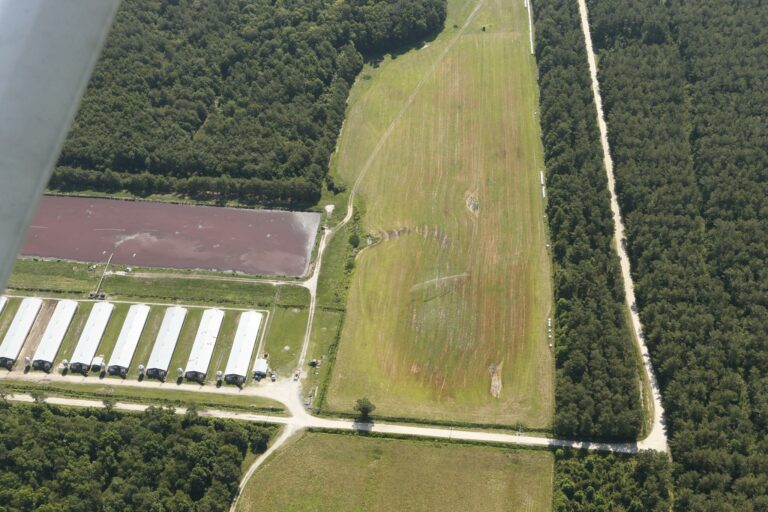Waterkeeper Alliance and Other Groups Petition EPA to Improve Oversight of Water Pollution from Concentrated Animal Feeding Operations
By: Waterkeeper Alliance

WASHINGTON, D.C. — Today, a nationwide coalition of 51 citizens’ groups and community advocacy, environmental justice, and environmental advocacy organizations, together representing tens of millions of people, in partnership with Earthjustice, petitioned the U.S. Environmental Protection Agency (EPA) to improve its oversight of water pollution from industrial-scale concentrated animal feeding operations, commonly known as Large CAFOs. The petitioning groups argue that improved oversight of Large CAFOs is necessary to satisfy the federal Clean Water Act and executive orders intended to advance environmental justice.
Large CAFOs make up less than 1% of farms in the United States, but the animals confined at these industrial facilities produce approximately one-third of all manure from farms nationwide. A single Large CAFO — which, according to EPA’s definition, confines at least 700 dairy cows, for example, or 2,500 swine weighing 55 pounds or more — can generate as much waste as a city. Unlike cities, however, Large CAFOs typically do not treat or disinfect animal waste prior to disposal.
In support of their request, the groups summarize decades of well-established scientific research showing that CAFOs — and Large CAFOs, in particular — routinely discharge water pollution that threatens public health and the environment, including nitrogen, phosphorus, disease-causing pathogens, and pharmaceuticals. In addition, they include personal stories from people who live in communities harmed by CAFO pollution across the country. These community members report that CAFOs create serious water contamination problems, degrade drinking water, and impair opportunities for fishing, boating, and engaging in other forms of recreation.
The petition also includes a new report detailing racial, ethnic, and other disparities in exposure to CAFO pollution. According to the report, CAFOs cause disproportionate harm to communities of color, low-income communities, and under-resourced rural communities in North Carolina, Iowa, and California’s Central Valley — all areas in which CAFOs are densely concentrated. To petitioners’ knowledge, this report is the first to describe the unequal harm that CAFOs impose on environmental justice communities in the Central Valley.
If granted, the petition would require EPA to adopt a rebuttable presumption that Large CAFOs using wet manure management systems actually discharge water pollution and, thus, must obtain water pollution discharge permits under the Clean Water Act. According to EPA, there are more than 21,000 Large CAFOs nationwide. EPA admits that many CAFOs discharge water pollution, but fewer than 6,300 Large CAFOs hold permits authorizing them to discharge pollution under federal law. Although some Large CAFOs operate under state-law permits, those permits typically are less protective of water quality, offer less transparency, and provide fewer opportunities for public participation, as compared with federal-law permits.
As of 2012, Large CAFOs generated 404 million tons of manure — that is, over 20 times the amount of fecal wet mass produced by all humans living across the United States. Large CAFOs using wet manure management systems — predominately, Large CAFOs that confine swine and dairy cattle — store animal urine and feces in liquid form, a practice that is especially likely to result in water pollution.
The Clean Water Act prohibits any CAFO from discharging water pollution without a permit issued under federal law. Executive Order 12,898 requires EPA to collect data on environmental justice issues, address those issues, and ensure that environmental justice communities are able to participate in EPA’s activities. Executive Order 14,008, which President Biden issued in 2021, directs EPA to strengthen enforcement of environmental violations that disproportionately harm environmental justice communities. EPA Administrator Michael Regan has specifically directed EPA staff to strengthen enforcement of environmental statutes and civil rights laws in communities overburdened by pollution.
“CAFOs across the country are releasing pollutants, like dangerous pathogens and nutrients that contribute to toxic algal blooms, into waterways in violation of the federal Clean Water Act, which requires permits that prohibit most pollution discharges,” said Kelly Hunter Foster, Waterkeeper Alliance senior attorney. “But more than 70% of the nation’s largest CAFOs do not have Clean Water Act permits and, since 2011, the percentage of unpermitted Large CAFOs has increased substantially as the industry has continued to construct and operate new large facilities.”
“Waterways in Eastern North Carolina are being decimated by runoff from Large swine CAFOs,” said Kemp Burdette, Cape Fear Riverkeeper at Cape Fear River Watch. “Our sampling has shown waterways with bacteria levels more than 600 times higher than the safe level set by the state. And the problem is getting worse every year.”